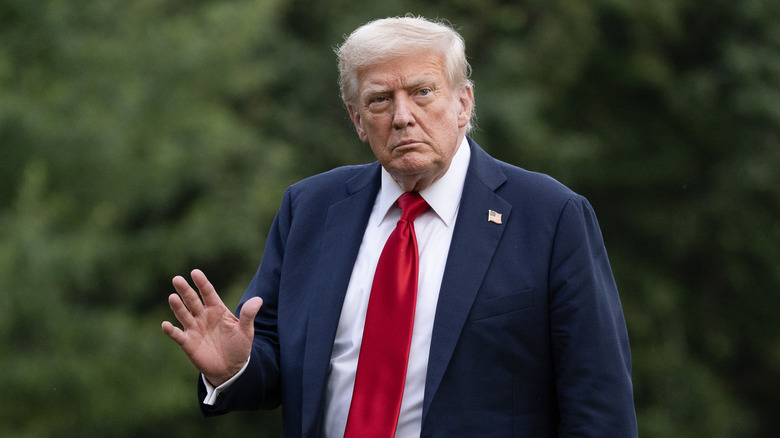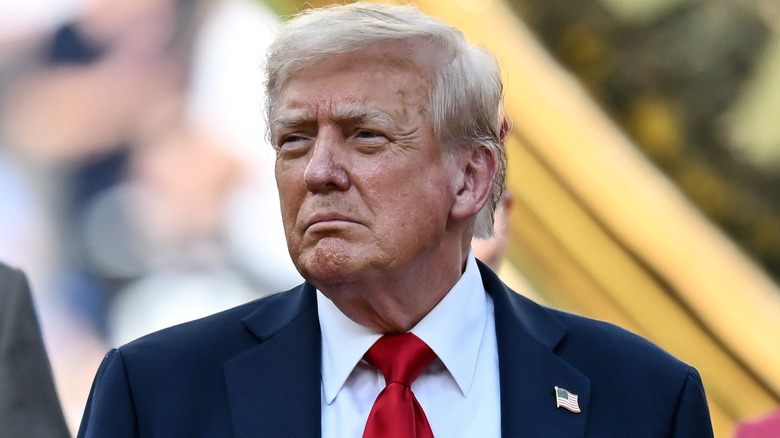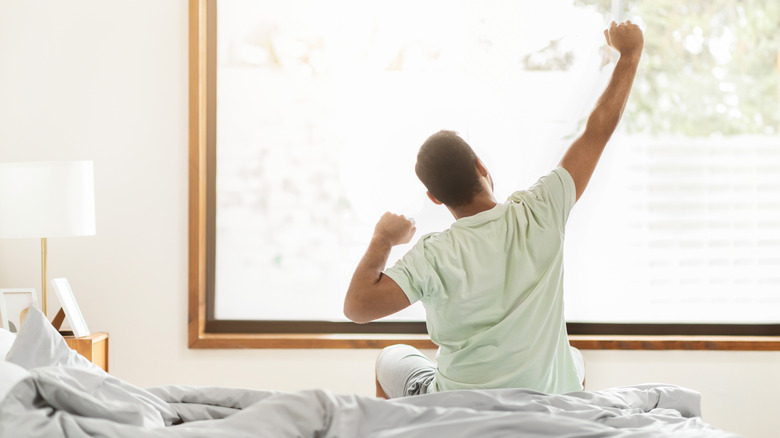Donald Trump's Sleep Habits Aren't Doing His Health Any Favors
If you follow President Donald Trump on Truth Social, you may notice some of his "truths" are posted late at night or extremely early in the morning. While trying to push his Big, Beautiful Bill through Congress before July 4, he vented his anger and frustration in a post that went up after midnight. Even during his first term, he would post on Twitter (now X) as early as 3 a.m. about a news story or issue that had him riled up.
These late-night or early-morning social media posts suggest he might not sleep much. In 2017, Trump told former Fox News host Bill O'Reilly that he usually went to bed around midnight or 1 a.m. and got up at 5 a.m. (via Palm Beach Post). And that doesn't even account for the mornings he posted before 5 a.m. (Here's how much sleep people over 50 need for healthy aging.)
Former White House physician Ronny Jackson didn't seem worried about Trump sleeping just four to five hours a night, telling reporters that he's one of those people who simply doesn't need much sleep (via Independent UK). While a small percentage of people may have a genetic mutation that lets them function on less than six hours of sleep, most people need at least seven to stay healthy (per the American Academy of Sleep Medicine). Sleep deficiency is linked to conditions Trump has or has had, like obesity and high cholesterol. Poor sleep is also associated with Alzheimer's disease, which contributed to his father's death.
Trump's sleep deprivation may affect his cognition and mood
Trump has often praised his own cognitive abilities, telling Fox News host Sean Hannity that he "aced" a cognitive test (via CBS News). However, some medical professionals have raised concerns about potential cognitive decline. Clinical psychologist Dr. Ben Michaelis told PBS NewsHour that after analyzing Trump's speeches over several decades, he noticed that Trump frequently lost his train of thought in speeches as early as 2016 and 2017. While Michaelis emphasized that he could not diagnose Trump without a formal evaluation, he noted that Trump appeared to be increasingly challenged in his thought processes. (Find out what happens to your brain when you're sleep deprived.)
Even without a formal dementia diagnosis, Trump's chronic sleep loss may be affecting his cognition. A 2020 study in JAMA Network Open followed more than 20,000 participants for several years, tracking their sleep habits alongside memory and thinking tests. Those who routinely slept four hours or less per night experienced a much faster decline in cognitive function than those who slept the recommended seven hours.
Trump's late-night tweets may also be affecting his mood the next day. A 2020 study in Economics Letters found that Trump's late-night Twitter activity (11 p.m. to 2 a.m.) rose more than fourfold between 2017 and 2020, suggesting a progressive reduction in his sleep. These late nights led to a threefold increase in angry speeches and interviews the next day. The authors concluded that Trump's sleep deprivation may have affected his mood.
Is Trump a short sleeper?
You can't ignore the possibility that Trump may not be affected by his lack of sleep. Jackson wasn't concerned about his sleep habits, and Trump may be one of those rare people who are natural short sleepers. Short sleepers account for about 1% of the population, and they can feel refreshed after getting less than six hours of sleep every night, regardless of the day of the week (per Healthier Sleep). Short sleepers are not the same as people who are sleep deprived and may feel tired or cranky during the day. According to the University of Utah, short sleepers tend to be optimistic, outgoing, and talkative. Former presidents Thomas Jefferson, Barack Obama, and Bill Clinton are known to be short sleepers (per LifeMD).
People who naturally need less sleep have special gene mutations that let them stay awake longer without feeling tired. These genes might also protect the brain from Alzheimer's disease, according to a 2022 study in iScience. Researchers used mice bred to develop Alzheimer's, finding that the mice with the short sleep genes had far fewer amyloid plaques and tau tangles — two key signs of Alzheimer's — as they aged. These mice also showed less brain inflammation and seemed to clear harmful substances from the brain more efficiently during sleep.


